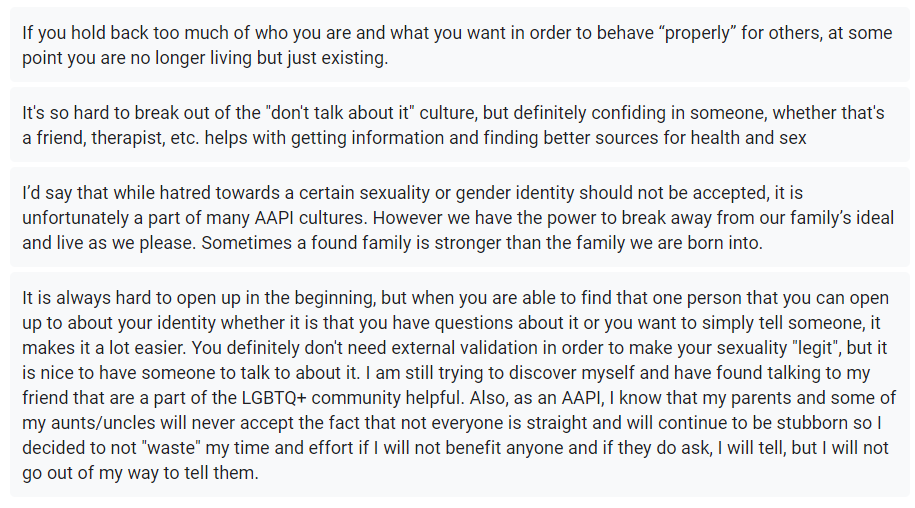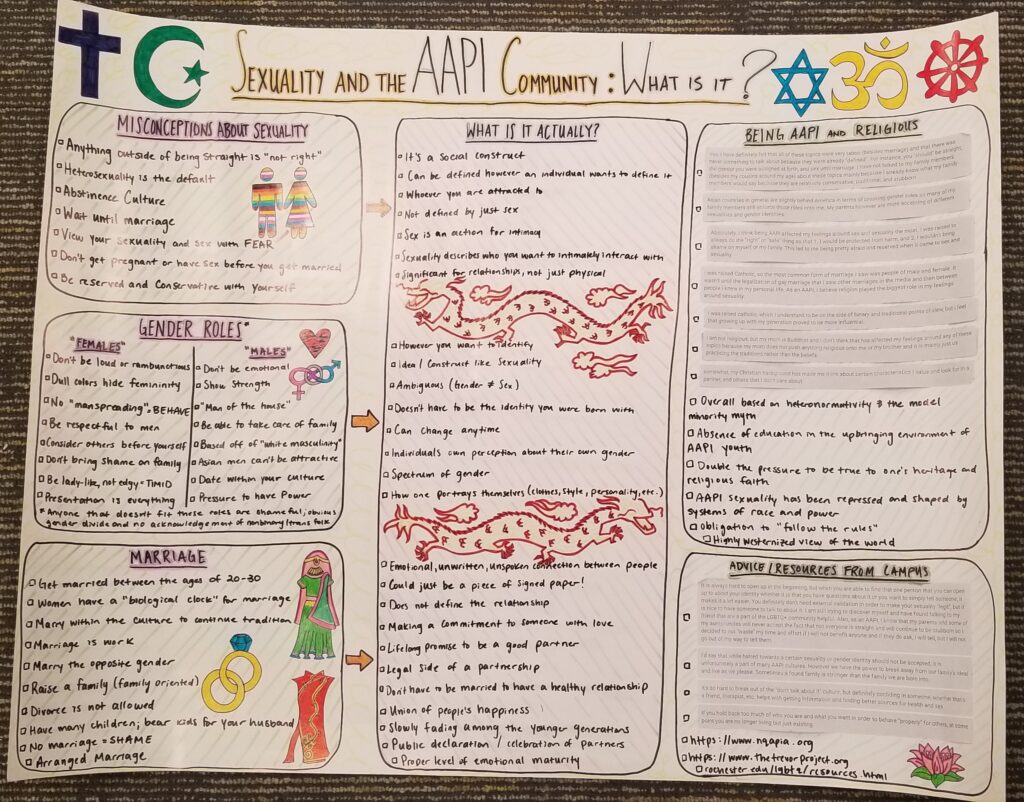“Asian men are not attractive”
“Arranged marriage is the only option”
“Asian women are docile and vulnerable”
Many stereotypes fall under the category of what it means to be Asian American in today’s society. Race plays a large role dealing with the stigmas around sexuality and gender, especially amongst the younger generation. For years the portrayal of AAPI individuals have been mainly centered around the model minority myth therefore placing discriminated groups against each other. Religious background can also influence young people pulling their impressionable minds one way or the other ultimately causing distress and many times confusion about their own identities. Luckily there are many resources out there to help resolve these issues.
This project focuses on the misinformation that is still being spread by people about how to view one’s own sexuality, gender identity and marriage. It was interesting to see outside perspectives compared to how someone feels about the topics themselves. The poster I made can act as a sort of reimagining of how tradition is taught to young adults. Rather than imposing fear into children, it is better to teach the acceptance of one’s own expression to push for a more progressive society.
Below are some of the opinions I was able to gather from anonymous individuals a part of the AAPI community.







Resources
NQAPIA, State of LGBTQ Rights in Asia and the Pacific. NQAPIA: A Federation of LGBTQ Asian American, South Asian, Southeast Asian and Pacific Islander Organizations, 12 February 2018, accessed 21 October 2021. http://www.nqapia.org/wpp/state-of-lgbtq rights-in-asia-and-the-pacific/.
Machacek, David W. and Melissa M. Wilcox, eds., Sexuality and the World’s Religions, (Santa Barbara: ABC-CLIO Press, 2003)
Ocampo, Anthony C. & Soodjinda, Daniel, “Invisible Asian Americans: The Intersection of Sexuality, Race, and Education Among Gay Asian Americans”, Race, Ethnicity and Education, 480-499. Vol 19 no. 3 1 November 2015.
Ting, Jennifer P. “The Power of Sexuality.” Journal of Asian American Studies 1, no. 1 (1998): 65-82. – Lee, Christine, “Sex Education Among Asian American College Females: Who is Teaching them and What is being Taught”, Immigrant Minority Health, 350-356. Springer Science+Business Media LLC, 5 July, 2021.
“Asian American Literary Theory.” In Literary Theory from 1966 to the Present, edited by Michael Ryan, 483-487. The Wiley-Blackwell Encyclopedia of Literature. Vol. 2 of The Encyclopedia of Literary and Cultural Theory. Chichester, UK: Wiley-Blackwell, 2011. Gale eBooks (accessed October 20, 2021).

This was a really cool project! I was intersted in people’s responses — I feel like we didn’t look at as much content about Asian individuals in western culture in class so this project did a great job in informing me on the topic. I noticed a trend of people describing their families as “stubborn” which I found interesting.
I loved loved loved this project! I love a good posters and your poster was detailed, neat, and so easy to read. Thank you so much for tackling such an important issue and for bringing it to light as a collective response from the AAPI community. I think you mentioned that this was from our school, and this really allows for all of us to have a better and deeper understanding of cross-cultural impacts on and of sexuality. Thank you! –ars
Amazing! I really appreciate how you used this project to take the space and time to uplift the voices of AAPI individuals, especially on these topics. Hearing their voices really brought important representation to the table that far too often doesn’t include nearly enough people. I’m also living for the poster, it’s to bright and engaging! Wonderful work!
Amazing project! I was so excited to see this because I also focused on the experiences of AAPI individuals but I loved that you created a one-stop-shop teaching tool and information center. I loved the inclusion of the advice column on your poster because I think it’s not only important to bring awareness to the problems of teachings of sexuality, but also to help others who might be struggling.
It’s very clear that most non-Western countries and cultures tend to be less progressive on topics such as homosexuality and sexuality. It is interesting that even people that live in America are still influenced by the teachings of those cultures rather than the social environment around them. It seems that it is a changing trend, but it still definitely persists and it will be interesting to see for how long it will continue to influence people.
Great project! Loved the creativity and I’m happy you went with the old school poster haha. I really appreciate how open this project was and how it was mostly composed of the input of those within the AAPI community and showed a perspective that I was unfamiliar with from voices that need to be uplifted. Fantastic job!
I always appreciate when people incorporate real people’s feelings and experiences in their projects. It makes them feel more personal and they have a bigger impact on the audience. I feel like especially in America, AAPI voices are often overlooked, so I’m so glad you gave a platform for this community. The concept of “honor” and how your actions reflect upon your family and community at large intersects in such a significant way with the ideas of purity culture we associate with Western, Christian culture. The poster itself is a super creative way to put these ideas together!
really enjoyed listening and reading more about your project! I feel like this work is super important because gender and sexuality play out so differently in different cultures, and it’s crazy to see those cultural differences when they are brought to the U.S. by immigrant parents. I appreciate how you start off by calling out the typical stereotypes of Asian women and men, and showing how they stem from white fantasy/fetishization of people of color. In a similar manner how white people love to call Latin@s spicy, and feisty. It’s like how they want us for our sex appeal but not us as human beings? Great work!
This was such a beautiful poster that had such great information on it! I loved looking through it during class and getting a sense of what other Asian Americans think about sexuality and how their cultural identities intersected with religion. Great project!
Love how you chose a topic close to you and found ways to reframe it. Love the visuals and information packed into the poster as well as the survey results. The answers were intriguing and I appreciate the diversity of backgrounds and religions represented. The intersections of culture and religion you explored were very thought provoking. Job well done!
The first thing that I have to say because I was thinking about it during class today is that I absolutely love the artistry on your poster board. I can tell that you put a lot of time into those drawing and they were awesome. I also just wanted to say that I loved the way that you presented your project today because you explained some pretty complex ideas in a refined yet detailed way which is very difficult to do, at least in my experience.
Everything from this project hit home! I learned so much about the gender roles and stereotypes that have long been present within Asian culture and it’s almost exactly the same I have experienced growing up in Pakistan- especially the expectations and ideas regarding marriage for women. I also LOVE the little artworks you’ve spread throughout your poster, they make it so engaging.
Your poster was so beautiful, and thank you for addressing how our perceptions of other races and their sexualities can be heavily influenced by pop culture. There are some really interesting videos by this channel called “The Take” that I watched on the over-sexualized asian woman and the desexualized/pervert asian man tropes that, unfortunately, can still be seen in media today. Hopefully the current trend in the rise of Asian filmmakers and stories can help deconstruct and disassemble these harmful stereotypes, along with people like you who speak of their own experiences of feeling these perceptions from others. On top of a wonderfully constructed poster, you have really summed up an issue perfectly by highlighting its nuances, thank you for presenting this!
You rocked it with your project! Through your different mediums you were able to display a thoughtful and informative message. I love the creativity and artistic talent behind it, and I love how the information on the poster goes hand in hand with the views of the member of the community!
The different perspectives were very insightful and provided an extra layer to this project. I love that you did a poster and we got to pass it around to see it in more detail. You could tell it took a lot of time. Additionally, I like that the focus was on the spreading misinformation and trying to tackle misinformation and stereotypes.